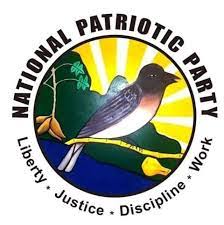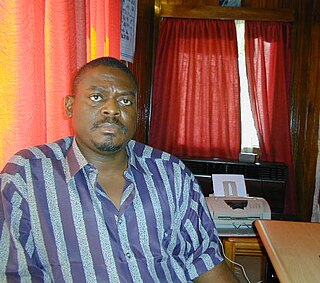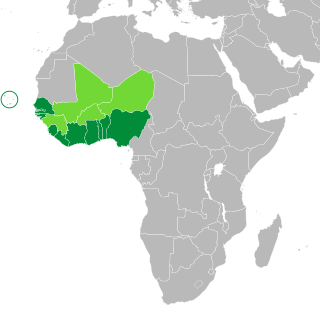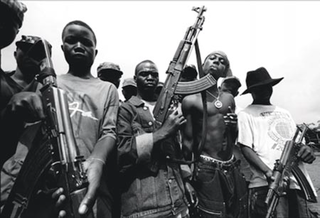
Liberia is a country in West Africa founded by free people of color from the United States. The emigration of African Americans, both freeborn and recently emancipated, was funded and organized by the American Colonization Society (ACS). The mortality rate of these settlers was the highest among settlements reported with modern recordkeeping. Of the 4,571 emigrants who arrived in Liberia between 1820 and 1843, only 1,819 survived (39.8%).

The Politics of Liberia takes place in a framework of a presidential representative democratic republic modeled on the government of the United States, whereby the President is the head of state and head of government; unlike the United States, however, Liberia is a unitary state as opposed to a federation and has a pluriform multi-party system rather than the two-party system that characterizes US politics. Executive power is exercised by the government. Legislative power is vested in both the government and the two chambers of the legislature.

The Armed Forces of Liberia (AFL) are the armed forces of the Republic of Liberia. Tracing its origins to a militia that was formed by the first black colonists in what is now Liberia, it was founded as the Liberian Frontier Force in 1908, and retitled in 1956. For almost all of its history, the AFL has received considerable materiel and training assistance from the United States. For most of the 1941–89 period, training was largely provided by U.S. advisers, though this assistance has not prevented the same generally low levels of effectiveness common to most of the armed forces in the developing world.

Samuel Kanyon Doe was a Liberian politician who served as the 21st President of Liberia from 1986 to 1990. He ruled Liberia as Chairman of the People's Redemption Council (PRC) from 1980 to 1986 and then as president from 1986 to 1990.
Prince Yormie Johnson is a Liberian politician who has served as a senator for Nimba County since 2006. A former rebel leader, Johnson played a prominent role in the First Liberian Civil War.

The National Patriotic Party (NPP) is a political party in Liberia. It was formed in 1997 by members of the National Patriotic Front of Liberia following the end of the First Liberian Civil War.

Major Johnny Paul Koroma was a Sierra Leonean military officer who was the head of state of Sierra Leone from May 1997 to February 1998.

The First Liberian Civil War was the first of two civil wars within the West African nation of Liberia. It lasted from 1989 to 1997. President Samuel Doe established a regime in 1980 but totalitarianism and corruption led to unpopularity and the withdrawal of the support of the United States by the late 1980s. The National Patriotic Front of Liberia (NPFL) led by Charles Taylor invaded Liberia from the Ivory Coast to overthrow Doe in December 1989 and gained control over most of the country within a year. Doe was captured and executed by the Independent National Patriotic Front of Liberia (INPFL), a splinter faction of the NPFL led by Prince Johnson, in September 1990. The NPFL and INPFL fought each other for control of the capital city, Monrovia and against the Armed Forces of Liberia and pro-Doe United Liberation Movement of Liberia for Democracy. Peace negotiations and foreign involvement led to a ceasefire in 1995 but fighting continued until a peace agreement between the main factions occurred in August 1996. Taylor was elected President of Liberia following the 1997 Liberian general election and entered office in August of the same year.

The Economic Community of West African States Monitoring Group (ECOMOG) was a West African multilateral armed force established by the Economic Community of West African States (ECOWAS). ECOMOG was a formal arrangement for separate armies to work together. It was largely supported by personnel and resources of the Nigerian Armed Forces, with sub-battalion strength units contributed by other ECOWAS members — Ghana, Guinea, Sierra Leone, The Gambia, Liberia, Mali, Burkina Faso, Niger, and others.

The Second Liberian Civil War was a civil war in the West African nation of Liberia that lasted from 1999 to 2003.
The United Liberation Movement of Liberia for Democracy (ULIMO) was a pro-government militia that participated in the First Liberian Civil War (1989–1996).
The National Patriotic Front of Liberia (NPFL) was a Liberian rebel group that initiated and participated in the First Liberian Civil War from 24 December 1989 – 2 August 1997. The NPFL emerged out of rising ethnic tensions and civil unrest due to the Liberian government that was characterized by totalitarianism, corruption, and favoritism towards ethnic Krahns. The NPFL invaded Liberia through Ivory Coast’s border with Nimba County in Liberia under the direction of Charles Taylor, a former Liberian politician and guerrilla leader who served as the 22nd president of Liberia from 2 August 1997 until his resignation on 11 August 2003.
The National Patriotic Front of Liberia-Central Revolutionary Council (NPFL-CRC) was a rebel group that participated in the First Liberian Civil War. The group emerged in mid-1994 and was a breakaway faction of the National Patriotic Front of Liberia (NPFL), which was led by Charles Taylor in full Charles Ghankay Taylor.

The Liberian-American-Swedish Mining Company (LAMCO) is a defunct Liberian corporation that mined for iron ore in the Nimba range in Liberia and exploited the area during the second half of the twentieth century. Founded in 1955 by American and Swedish investors, the company established the first large-scale mining operation in Liberia following the discovery in the 1950s of the Nimba ore body by geologist Sandy Clarke.
The Iron Ladies of Liberia (2007) is an independently produced documentary film that gives behind-the-scenes access to President Ellen Johnson Sirleaf's first year in government. Johnson-Sirleaf is Africa's first female president.

Jucontee Thomas Woewiyu, also known as Tom Woewiyu or Thomas Smith, was the former leader of the National Patriotic Front of Liberia (NPFL), with Charles Taylor.
Dorothy Harriet Eugenia Musuleng Cooper was a Liberian educator, politician and the first woman to serve as Foreign Minister in Liberia. She was born at Arthington, Liberia and obtained her B.S. and M.S. from College of West Africa and San Francisco State University respectively. She worked as a school teacher between graduation and high school and matriculation in 1964 in San Francisco in 1964, curriculum development in the Ministry of Education, and principal of Cuttington University College. She was an education minister in Charles Taylor's shadow government from 1990 to 1993 in the National Patriotic Reconstruction Assembly Government
Tecumsay Roberts was a Liberian singer and dancer.

The Liberia national transitional government was a provisional government, or rather the name given to three successive governments, in Liberia formed in the midst of the First Liberian Civil War. The LNTG was product of the July 25, 1993, Cotonou Peace Accord, whereby the Interim Government of National Unity disbanded. The respective LNTG-I, LNTG-II and LNTG-III governments were differentiated by being led by three different chairpersons. Initially supposed to last for six months to allow for disarmament of warring factions and preparations of national elections, the LNTG timeline lasted until mid-1997. Various of the warring factions had direct participation in the LNTG and civilian elements were gradually sidelined. Through participation in the provisional governance of LNTG the different warlords could gain access to state resources, even in situations when armed hostilities continued. The LNTG period ended with the 1997 Liberian general election whereby Charles Taylor was elected President of Liberia.
Joseph W. Mulbah (1956–2011) was a Liberian journalist and politician. He served as Minister of Information, Culture and Tourism and Minister of Transport.











